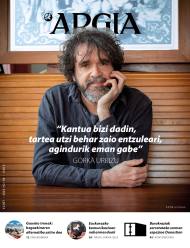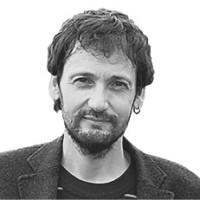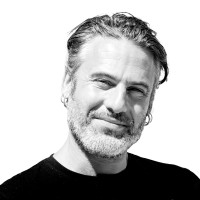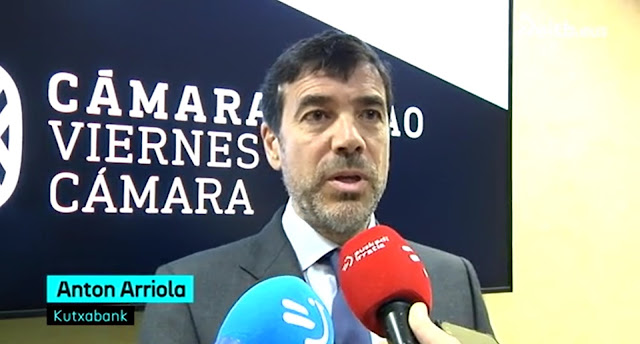Nevada
“How are you?”
“Bad, bad. Subject to machine.
“You’ll turn it around because you’re tough.
I don't know. Now I don't know.
This was the last interview with his American uncle. He was a pastor to Nevada, where he founded his family, his new life. They have come from time to time to Euskal Herria, but not too many times. After aging, much less.
He brings them with him, who no longer tells us, the joys and sorrows experienced upon reaching America, their cold and lonely winters and the anguish of having to make money. Or that's what I imagined when I saw the documentary Amerikanuak. Not a few people lost their heads; many wasted what they gained in winter in summer; others have lived happily; others may not make the decision to leave if they were born again.
Migratory processes are violent, especially for those fleeing poverty. In those arid areas where Basque pastors were used to frequenting, there are now South American workers. The world and technology have advanced, but the hard professions do not disappear and it is always the same social class that performs them. The origin of the poor is the only one that changes.
The world and technology have advanced, but the hard professions do not disappear and it is always the same social class that performs them.
I don't know how many things a migrant can feel, the desire to adapt to the new place or the lack of land left behind, who will win the sokatira. It is probably a continuous transit between the two. We will have to think about what to take and what to leave, how much to remember and how much to forget for survival to be sustainable. Our uncle had a good Basque, 60 years ago, the same one his parents used, kept in the formoles. But he decided to keep himself for him, he didn't teach him to his descendants. This phone conversation may be the last time the Basque was heard in that house.
I've always been surprised by this of denying your children the original language. I know that it is not so simple, and that there are many forces here, of course, in the case of minority languages. I'd like to know what he thought, what Euskera felt to his uncle. Perhaps I would live it as a floor that had to be disposed of, as an old line that linked a sad past. Or it would seem like a set of words that would not serve their American descendants at all. It is possible that the offspring have not shown interest, beyond a couple of phrases learned as a child. I don't know, and if you'll ever know, you'll tell me in English.
Bidali zure iritzi artikuluak iritzia@argia.eus helbide elektronikora
ARGIAk ez du zertan bat etorri artikuluen edukiarekin. Idatzien gehienezko luzera 4.500 karakterekoa da (espazioak barne). Idazkera aldetik gutxieneko zuzentasun bat beharrezkoa da: batetik, ARGIAk ezin du hartu zuzenketa sakona egiteko lanik; bestetik, egitekotan edukia nahi gabe aldatzeko arriskua dago. ARGIAk azaleko zuzenketak edo moldaketak egingo dizkie artikuluei, behar izanez gero.
Badira bi aste beste behin makroproiektuei kaleetan oposizio argi bat erakutsi geniela. Milaka eta milaka pertsona atera ginen kalera dinamika suntsitzaile honek amaitu behar duela aldarrikatzera. Bada, dirudienez horrek ez du lurraren suntsiketaren aldeko politikarietan inolako... [+]
A few weeks ago, on Diputación Street, in the centre of Vitoria-Gasteiz, two men threw a homeless person off the small landing outside the place where he slept. In addition to being thrown away, a metal railing was immediately placed in front of the lonja. Although the place... [+]
Wikipedian bilatu dut hitza, eta honela ulertu dut irakurritakoa: errealitatea arrazionalizatzeko metodologia da burokrazia, errealitatea ulergarriago egingo duten kontzeptuetara murrizteko bidean. Errealitatea bera ulertzeko eta kontrolatzeko helburua du, beraz.
Munduko... [+]
Egypt ' s urban planning plan for the Gaza Strip has recently been expanded. A drawing shows the streets, buildings and imagery of the future on a reality that still smells of shrapnel and explosives. The urban planning proposal, used as another bomb shot. Individual house... [+]
Bizitza erdigunean jartzeko abagunea ikusi genuen feministok zein ekologistok Covid-19 pandemia garaian. Ez ginen inozoak, bagenekien boteretsuak eta herritar asko gustura itzuliko zirela betiko normaltasunera. Bereziki, konfinamendu samurra pasa zutenak haien txaletetan edo... [+]
Segurtasun falta dagoen irudipena handitu dela azaldu du Eustaten azken txostenak. Gurean, Trapagaranen, Segurtasuna orain, delinkuenteen aurka manifestaziora deitu dute herritar batzuek.
Bi izan dira sentsazio hori zabaltzeko arrazoiak. Batetik, udalak Udaltzaingoaren... [+]
There are those who subscribe to portals to sell their homes because they would like to buy a house. From time to time they even make appointments to see the houses, and I am sure that the seller knows that these people will not buy the house, not because they find it in the... [+]
Haurtzaroaren amaiera eleberri distopikoa idatzi zuen Arthur Clarkek, 1953. urtean: jolasteari utzi dion gizarte baten deskribapena. Eta ez al da bereziki haurtzaroa jolasteko garaia? Jolasteko, harritzeko, ikusmiratzeko eta galdera biziak egiteko unea. Ulertzeko tartea zabalik... [+]
The writer Juan Bautista Bilbao Batxi worked in a boat and sent the chronicles of his travels to the newspaper Euzkadi. Thanks to this, we have interesting chronicles in Basque from around the world from the beginning of the 20th century. In June 1915, he made his stop in... [+]
The lights of the theater are on. Discreetly, I’m walking on the steps: the school performance is about to begin. The young men run to their seats, full of life and joy. The retreat has the taste of liberation, but this feeling of freedom speaks Spanish or French. This... [+]
From linguistics or glotophobia and, of course, hatred against Basque, we have often seen our Basque become the dandruff of all sticks. Last of all, the president of Kutxabank, Anton Arriola, has been shaking our language and giving us galantas.The President of Kutxabank,
... [+]
Do not look for this connection from Ezkio or Altsasu, let alone crossing the Ebro River through Castejón. The connection, or rather the connections, between the Basque Y and the AVE of Navarre is already a reality. It is these links in the plural that should concern us and... [+]
Don't make a fuss, don't confront, don't victimize... and obey. As oppressed subjects, in this case as Basques, we talk, how many times have we had to listen to them? Ironically, two years ago, at the Euskalale Independentiston Meeting, Esne Arzallus said: "We have arrived here,... [+]
Aurten "Israel Premier Tech" txirrindularitza talde israeldarra ez da Lizarraldeko Miguel Indurain Sari Nagusia lasterketara etorriko. Berri ona da hori Palestinaren askapenaren alde gaudenontzat eta munstro sionistarekin harreman oro etetea nahi dugunontzat, izan... [+]





















